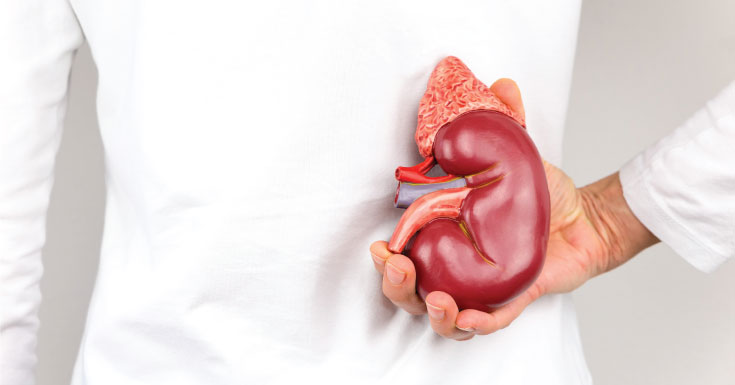Generally, everyone is born with a pair of healthy kidneys. They are usually at the peak of their performance when we reach full maturity. Unfortunately, nothing lasts forever and this goes for your kidneys as well. Even for those who do not have any morbidities, kidney performance will deteriorate at the rate of around 0.5% every year. Despite this rate of natural decline, most people will not develop chronic kidney disease or end stage kidney disease requiring dialysis, as there will be enough kidney reserve to sustain them throughout their natural life.
So, to keep your kidneys healthy, the most important thing is to avoid circumstances that will hasten the rate of kidney function decline. Ultimately, an unhealthy lifestyle, and chronic diseases such as hypertension as well as diabetes (among others), affects kidney function.
How important is the role of the kidneys in your overall health?
Kidneys are essential organs in sustaining life, and they play multiple roles in the body. One of which is the removal of wastes and toxins in the form of urine. Besides that, your body’s hydration status is also dependent on your kidneys. If you’ve ever been dehydrated, you may have noticed that your urine volume is reduced and it’s more concentrated, appearing in a darker yellowish colour. In contrast, your urine volume will increase and appear clearer once you rehydrate.
The other less well-known function of the kidney is that it plays an essential role in red blood cell generation by producing a hormone called erythropoietin. Erythropoietin stimulates your bone marrow which is the factory of red blood cell production.
Kidneys also help maintain bone health by regulating vitamin D, calcium and phosphates in our blood. Finally, the kidneys play a major role in acid base balance. Your cells will not function optimally if the acidity in your blood is disrupted.
What are 3 common causes of chronic kidney disease?
Chronic kidney disease is a condition whereby there is abnormal kidney function or anatomy that lasts for 3 months or more. The most common causes of chronic kidney disease are diabetes and hypertension. These two conditions contribute to about 80% of end stage kidney disease aetiology.
Other causes of chronic kidney disease are autoimmune diseases such as Lupus or IgA nephropathy. These are conditions where the antibodies in the body cause damage to the kidney cells.
Nephrotoxins as a cause of chronic kidney disease must be highlighted as it can be avoided if there is adequate awareness. Nephrotoxins are substances that can cause kidney damage when consumed in sufficient amounts. The most common among these are painkillers of the Non-steroidal Anti-inflammatories (NSAIDS) and COX-2 inhibitor class. Certain health care products and herbal medications are known to cause kidney damage as well.
5-tips for maintaining healthy kidneys:
- Keep hypertension and diabetes under control
- Ensure adequate hydration
- Consume more fruits and vegetables
- Avoid nephrotoxins
- Regular medical check-ups to ascertain kidney function
What is one of the earliest signs of kidney damage?
Unfortunately, kidney disease does not have many signs and symptoms at its earlier stages. When someone has symptoms of kidney disease, most of the time it is detected at a later stage when damage is irreversible.
Having said that, the earliest sign of kidney damage is bubbles in the urine, which indicates the presence of protein. A urine test is recommended at this juncture, to check for the presence of protein or albumin.
In a way, the kidneys function as a filter, unwanted toxins and wastes are filtered out as urine and beneficial molecules such as protein and albumin are retained. Hence, if there is leakage of protein into the urine, this indicates early kidney damage. At this point, your kidney function may still be normal and protein or proteinuria in the urine may be reversible. Managing this can avoid permanent damage to your kidneys.
The other early sign of kidney disease is ankle swelling or pedal oedema. This is water retention in the body. One of the functions of the kidney is maintaining hydration and electrolyte balance. If this is impaired, it will lead to water retention, and it usually presents itself as ankle oedema.
Late symptoms of kidney disease are breathlessness, poor appetite, tiredness, extreme itchiness, nausea and vomiting. These symptoms occur because the kidney function is so low that it is unable to remove adequate wastes, toxins and water from the body. Most of the time, by this stage, emergency dialysis is required.
When should you get your kidneys checked?
As mentioned, those who have signs and symptoms of kidney disease should seek medical attention immediately. However, the signs of kidney disease are usually subtle and the damage may be extensive once the symptoms present themselves.
That’s why screening for kidney disease is very important to detect early kidney damage. Screening tools for kidney disease are usually non-invasive and affordable for most. It usually involves simple urine and blood tests, as well as an ultrasound examination (if required).
Those that are at risk or have the following diseases should go for kidney disease screening as soon as possible;
- Diabetes and Hypertension
- Age >65 years
- Obese
- Gout
- Heart disease patients
- Autoimmune multisystem disease
- Kidney stones or enlarged prostate
- Consume painkillers and gastric medications regularly
- Family history of chronic kidney disease or hereditary kidney disease
 Dr Ong Chun Seong
Dr Ong Chun Seong
Internal Medicine, Nephrology Renal Medicine,
Pantai Hospital Cheras


